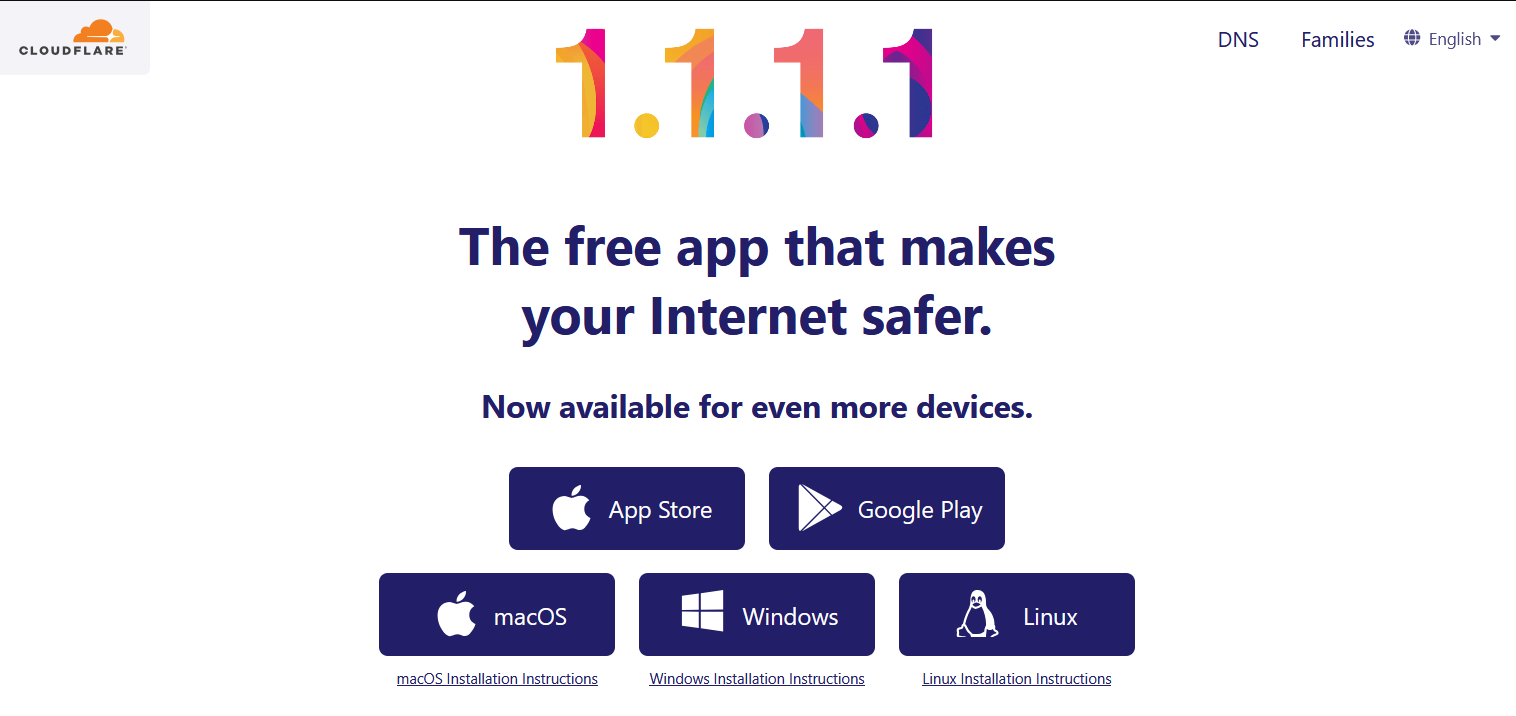In April 2018, Cloudflare launched 1.1.1.1, a public Domain Name System (DNS) resolver designed to make internet browsing faster, more secure, and more private. But what exactly is 1.1.1.1, and why does it matter to everyday internet users?
What is 1.1.1.1?
The Domain Name System is often called the “phonebook of the internet.” It translates human-friendly domain names (like example.com) into IP addresses (like 104.16.123.96) that computers use to locate websites. A DNS resolver is the server that handles this translation. Cloudflare’s 1.1.1.1 is a public DNS resolver, meaning anyone can use it for free by configuring their device or router to point to its IP addresses (1.1.1.1 and 1.0.0.1).
Unlike many DNS resolvers provided by Internet Service Providers (ISPs) or other tech giants, 1.1.1.1 stands out for its focus on speed, security, and privacy. It’s operated by Cloudflare in partnership with APNIC, a regional internet registry, and is accessible globally.
Why Choose 1.1.1.1?
Speed: Independent tests by DNSPerf consistently rank 1.1.1.1 as the fastest DNS resolver globally. Leveraging Cloudflare’s extensive network of over 330 data centers worldwide, it minimizes latency by resolving queries closer to users. For websites hosted on Cloudflare’s platform, queries are often resolved even faster due to direct access to cached data.
Privacy: Unlike some DNS providers that collect and sell user data for advertising, 1.1.1.1 prioritizes privacy. Cloudflare does not sell user data, purges logs within 24 hours, and employs query name minimization to limit the information sent during DNS lookups. It was audited by KPMG in 2020, confirming its no-logs policy.
Security: 1.1.1.1 supports advanced encryption protocols like DNS over HTTPS (DoH) and DNS over TLS (DoT), which prevent eavesdropping and spoofing by malicious actors or ISPs. These features protect users from on-path attacks and ensure queries remain private.
1.1.1.1 for Families: Launched in 2020, this variant (using IPs 1.1.1.2/1.0.0.2 for malware blocking and 1.1.1.3/1.0.0.3 for malware and adult content blocking) adds filtering for home users. It’s easy to set up and provides an extra layer of protection, though it faced criticism for initially blocking some LGBTQIA+ sites due to a categorization error, which Cloudflare quickly corrected.
WARP: Cloudflare offers WARP, a free app built on 1.1.1.1, which extends security to all device traffic, not just DNS queries. WARP routes traffic through Cloudflare’s network, offering VPN-like benefits without the performance drawbacks of traditional VPNs. WARP+ provides faster routing for a small fee.
How to Use 1.1.1.1
Setting up 1.1.1.1 is straightforward. Users can manually configure their device or router to use the IP addresses 1.1.1.1 and 1.0.0.1 (or 1.1.1.2/1.0.0.2 or 1.1.1.3/1.0.0.3 for Families). Alternatively, the 1.1.1.1 mobile app for iOS and Android simplifies setup and includes WARP. For encrypted connections, users with DoH- or DoT-compliant devices can configure secure DNS queries.
Challenges and Considerations
While 1.1.1.1 is widely praised, it’s not without issues. Its memorable IP address (1.1.1.1) was historically used for testing, leading to some networks blocking it or misconfiguring devices, though providers like AT&T have worked to resolve this. Additionally, while WARP enhances privacy, it doesn’t hide your IP address like a full VPN, and it lacks features like kill switches or server location selection.
Why It Matters
Cloudflare’s 1.1.1.1 is a game-changer for internet users seeking a faster, more private browsing experience without sacrificing security. Its free access, global reach, and commitment to not monetizing user data set it apart from competitors like Google’s 8.8.8.8 or Quad9’s 9.9.9.9. Whether you’re a casual user or a privacy advocate, 1.1.1.1 offers a simple way to enhance your online experience.
For more details or to set it up, visit https://1.1.1.1 or check your device’s DNS settings. Join the millions already using 1.1.1.1 to make the internet faster and safer.
Why Magazine.capetown felt 1.1.1.1 is Relevant?
Growing Privacy Concerns:
With increasing awareness of online tracking by ISPs and advertisers, 1.1.1.1’s privacy-first approach resonates with users. Its no-logs policy, verified by independent audits, and support for encrypted DNS protocols (DoH and DoT) address critical privacy needs in an era of data breaches and surveillance.
Family Safety:
The 1.1.1.1 for Families service addresses the demand for safe internet access at home, particularly for parents wanting to protect children from malware and inappropriate content. Despite early missteps with content filtering, Cloudflare’s quick response shows its commitment to user trust.
Performance Demands:
As internet usage grows—evidenced by 1.1.1.1 handling over 400 billion queries daily in 2021—speed remains crucial. Its status as the fastest DNS resolver, backed by Cloudflare’s global network, appeals to users and businesses needing reliable, low-latency connections.
Accessibility and Ease:
The service’s free availability, easy setup, and mobile app make it accessible to a broad audience, from tech enthusiasts to casual users. Its integration with WARP extends its appeal to those seeking VPN-like features without complexity or cost.
Global Impact:
1.1.1.1’s role in improving internet infrastructure aligns with Cloudflare’s mission to “build a better internet.” Its partnerships, like with APNIC, and initiatives like Project Galileo and Athenian Project underscore its broader societal impact, making it a relevant topic for discussions on internet equity and security.
Ongoing Challenges:
Issues like network blocks in some regions (e.g., Indonesia in 2022) and compatibility with certain devices highlight ongoing challenges, making 1.1.1.1 a dynamic subject for exploring internet governance and technical hurdles.

